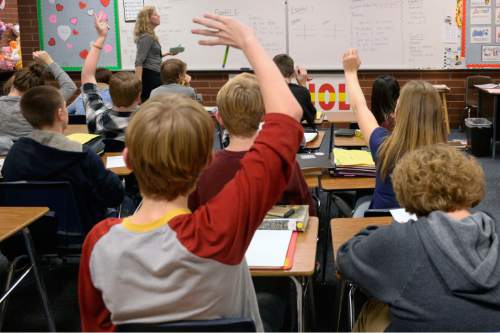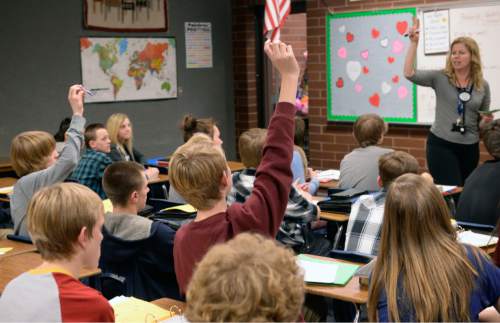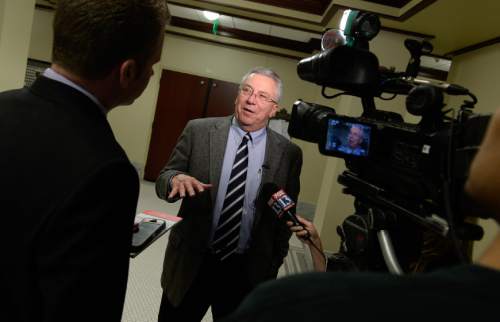This is an archived article that was published on sltrib.com in 2015, and information in the article may be outdated. It is provided only for personal research purposes and may not be reprinted.
A proposed tax increase to boost teacher pay and fund school technology fizzled and flamed out at its first legislative hearing Monday.
With a nearly unanimous vote, members of the House Education Committee rejected North Logan Republican Rep. Jack Draxler's idea of hiking the state's personal income tax rate from 5 percent to 5.5 percent.
Drazler's bill, HB54, would have generated more than $420 million in annual funding for public schools.
But the Utah Taxpayers Association, led by Draper GOP Sen. Howard Stephenson, had mobilized its members to fight the legislation.
Draxler said lawmakers have been "spinning our wheels" for too long on the subject of public education. Utah's per-pupil spending is perennially at the bottom of the list when compared to other states'.
"What I'm trying to emphasize is we need a reality check and we don't need the reality check five or 10 years down the road," Draxler said. "We need it now."
But his call for a tax increase, already an unpopular concept in Utah's tax-averse Legislature, was further stymied by prescriptions on how the additional funding would be spent.
Under the draft bill, 50 percent of the new revenue would be used to fund a performance-based pay system for teachers, which is set to launch statewide during the 2016-17 school year.
The remaining revenue would be split evenly between a standard salary bump for all teachers and investments in school technology and infrastructure.
Several committee members Monday questioned whether earmarks should be placed on income tax revenue, rather than allowing for the Legislature's traditional budget prioritization process.
"I think without trying to, you're arguing that the concepts in this bill are better than our appropriations process," said Rep. Dan McKay, R-Riverton.
Hurricane Republican Rep. Brad Last also suggested the parameters in HB54 could hurt its chances of passage.
"As others have said, we have this deliberative process," Last said. "I do have some concerns about trying to establish policy in your bill."
Draxler said his goal was to elevate the teaching profession in Utah in order to attract and retain high-quality educators. He said research and most educators agree that an effective teacher is the strongest indicator of student success.
Comparatively low salaries, Draxler said, encourage even the best teachers to pursue jobs out of state or leave the classroom.
"I personally know several outstanding teachers who have gone to Wyoming. Some have gone to Nevada. Some go into administration," he said. "And a pretty good number go into the private sector."
Recent polls have generated contradictory results on the question of raising taxes to fund schools.
A poll released in January by UtahPolicy.com found 54 percent of respondents were opposed to a tax hike.
The same month, a poll by Utah State University and the Exoro Group found 59 percent of Utahns polled support a tax increase that would benefit classrooms.
Draxler said the contradiction was in the wording of the poll questions, with voters supporting bills like his that target revenues raised at the classroom.
But Billy Hesterman, vice president of the Utah Taxpayers Association, said a low tax rate is what makes Utah appealing for economic activity. He compared raising income taxes to placing a "closed for business sign" on the state.
"Our state, right now, is enjoying great economic growth," Hesterman said. "A half a percent [tax] increase will slow that activity."
Draxler's original bill called for boosting Utah's income tax rate by a full percentage point — up to 6 percent. He decided to replace that version with a lower bump, not due to pressure from the Utah Taxpayers Association, he said, but out of respect for competing state interests.
"I don't feel it's appropriate to address only one issue at the expense of others," he said. "We've got a job to do of balancing these needs."
After the committee voted 11-2 along party lines to kill the measure, Draxler said he would "weigh in aggressively" during budget negotiations to advocate for teacher pay and technology investment.
Salt Lake City Democratic Reps. Marie Poulson and Carol Moss cast the only votes in favor of sending HB54 to the full House.







